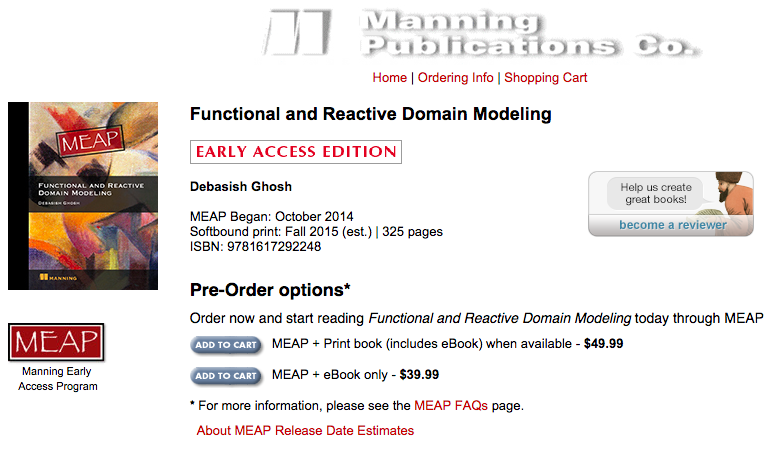Functional and Reactive Domain Modeling by Debasish Ghosh.
From the post:
Manning has launched the MEAP of my upcoming book on Domain Modeling.
The first time I was formally introduced to the topic was way back when I played around with Erik Evans’ awesome text on the subject of Domain Driven Design. In the book he discusses various object lifecycle patterns like the Factory, Aggregate or Repository that help separation of concerns when you are implementing the various interactions between the elements of the domain model. Entities are artifacts with identities, value objects are pure values while services model the coarse level use cases of the model components.
…
In Functional and Reactive Domain Modeling I look at the problem with a different lens. The primary focus of the book is to encourage building domain models using the principles of functional programming. It’s a completely orthogonal approach than OO and focuses on verbs first (as opposed to nouns first in OO), algebra first (as opposed to objects in OO), function composition first (as opposed to object composition in OO), lightweight objects as ADTs (instead of rich class models).
The book starts with the basics of functional programming principles and discusses the virtues of purity and the advantages of keeping side-effects decoupled from the core business logic. The book uses Scala as the programming language and does an extensive discussion on why the OO and functional features of Scala are a perfect fit for modelling complex domains. Chapter 3 starts the core subject of functional domain modeling with real world examples illustrating how we can make good use of patterns like smart constructors, monads and monoids in implementing your domain model. The main virtue that these patterns bring to your model is genericity – they help you extract generic algebra from domain specific logic into parametric functions which are far more reusable and less error prone. Chapter 4 focuses on advanced usages like typeclass based design and patterns like monad transformers, kleislis and other forms of compositional idioms of functional programming. One of the primary focus of the book is an emphasis on algebraic API design and to develop an appreciation towards ability to reason about your model.
…
An easy choice for your holiday wish list! Being a MEAP, it will continue to be “new” for quite some time.
Enjoy!
